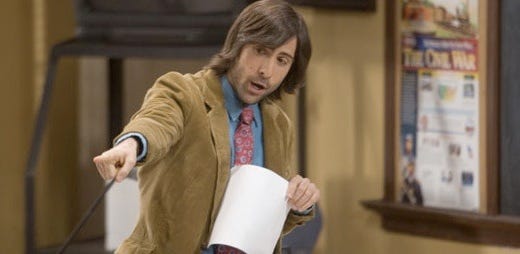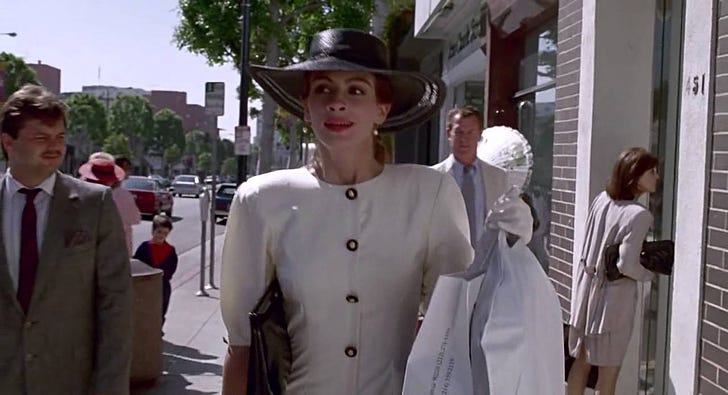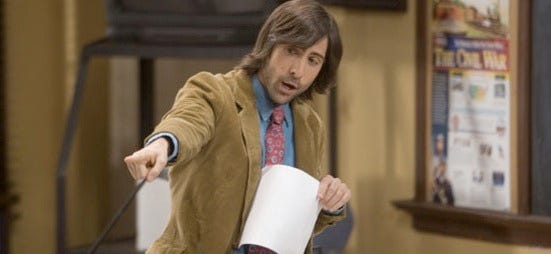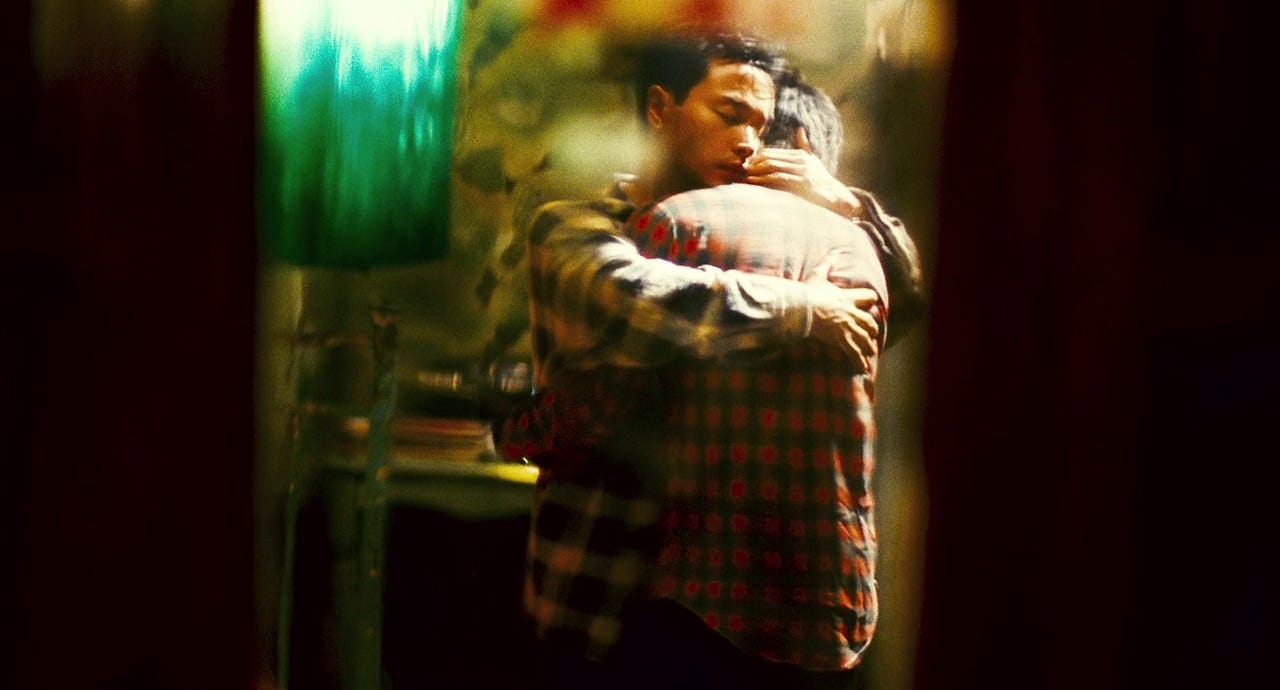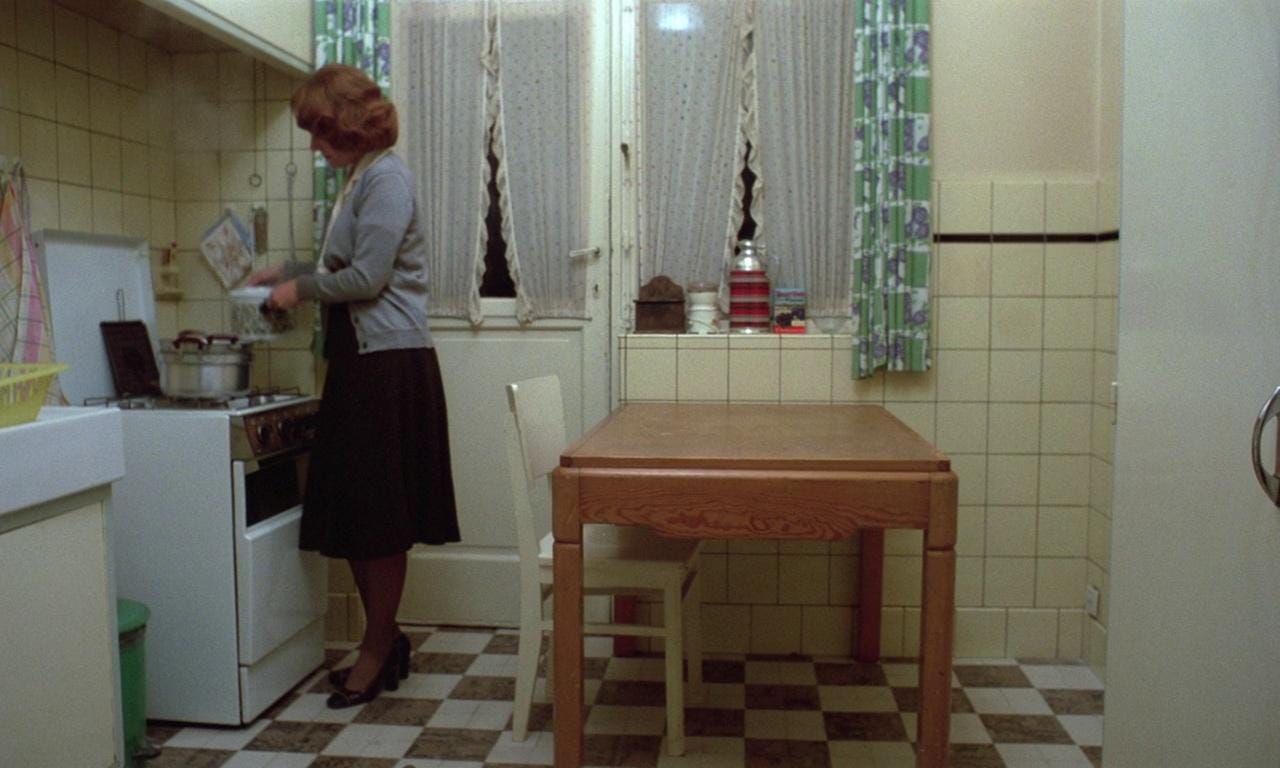Syllabi have been at the core of the Marshall and the Movies newsletter since its inception.
But I’m just an amateur hobbyist at this. Some people do it in an actual educational context, not just the inside of your Gmail inbox. So in the back-to-school spirit, I thought it might be a good day to chat with one of those people!
If you love movies (and I hope you do if you subscribe to this newsletter) but never got to take a true cinema 101 class, I’ve got just the guy who can walk you through one for the low cost of a subscription to this newsletter!
My friend
recently taught his first Cinema Studies course, The Art of the Cinema, at Palomar College. We talked about how the semester went before he walked me through the movies he chose to illustrate key topics in moviemaking. All newsletter recipients get to read him discuss putting together a syllabus, but only paid subscribers will get to “take” the class and hear him walk through the individual choices by theme and film.Pedagogically – big SAT word to show you how smart I am – what was your approach to teaching an intro to film class? What were the constraints and surprises? Maybe you should start with your biggest one…
The course was already titled "Art of the Cinema" when they hired me, and the only thing I was really told was that it was supposed to have the rigor of a freshman-level intro to film study course. It was not a history course, but a course in aesthetics and learning how to read a film, how to read politics and identity into a film, camera and editing choices filter into it. They gave me totally free rein to make my own syllabus. They gave me prior adjuncts' sample syllabi, and I was free to take from it. But I really built my own syllabus entirely, and they told me I have carte blanche, essentially.
I didn't do community college; I went to a four-year liberal arts college and then grad school. I was expecting in my head a very stereotypical version of a community college course: anywhere from like, 17 to 25-year-olds. And boy, howdy, was that not what happened. I arrived on my first day, and the first class I walked into was a high school. So I'm already surprised by a class of 17 high school seniors. All of them were 17; maybe a couple of them had already turned 18. But the bigger surprise was that, in the afternoon, I went to my second class which was on Palomar College's actual campus. And so that's where I was, like, "All right, here we go, here are my college kids!" And it got even younger. I walked into a classroom of 33 ninth graders barreled in.
That was a big shock, especially because I built a syllabus where I had intended to talk a lot about theory, politics, sexuality, and queerness. I started just having cold sweats. I asked them if they were in the right place! It was so confusing. I had a series of phone calls with administrators after that because there just was a terrible amount of miscommunication between the people who hired me, the school itself, and the program.
This is where it gets really specific, which is that the program that the ninth graders are in is something that Palomar calls a Middle College program. And the way it works is that from ninth grade to the end of high school, students in the Middle College program take one required college-level course alongside their more typical high school courses. The semester I taught was a required film studies course for ninth graders, which I find very strange. Then they also take Latino Studies or an economics course. Demographically, I should point out that 99% of my students were Latinx, and a lot of them are learning English on top of also learning about movies. Their parents were immigrants from the Global South, typically Mexico. The program is designed to both pique their interest in college and also slowly usher them into the kind of coursework they might expect a few years down the line.
All that is to say I really had to do some immediate backpedaling because my intention initially was, which is a little funny, to show them Wong Kar-Wai's Happy Together since he's a big, expressive filmmaker who paints in broad strokes. A lot of people become cinephiles because of filmmakers like Wong Kar-Wai, Federico Fellini, or Wes Anderson, these filmmakers have particular styles that they can go like, "Oh my god, okay, it's an art form." But considering the subject of that film and that I had ninth graders, I was like, "Alright, let me backpedal and ease them into things." I ended up starting off with Moonrise Kingdom. It's Wes Anderson; it's about kids.
The other constraint I want to point out is that these were my classes were 90 minutes long. And I think I have colleagues that are okay with showing 90 minutes of Citizen Kane, let's say, and then finishing it off two days later. But I didn't want to do that. Kids these days already have a really short attention span, and even 90 minutes can be kind of a tall order for them. I built the syllabus with the intention of not showing them anything that I would have to then finish on another day.
When I talk with my film professors, they say I would be shocked at how little the attention spans have gotten and how much harder it is to teach film. Did you find that held true?
I don't want to sound like a boomer, but when I took my first film studies course in 10th grade, I had a flip phone. I remember one of my best friends got the first iPhone, and I remember then being like, "Why do you have an iPhone? That's so insane. It's not like you're a businessman!" And now all the kids have iPhones, and on top of that, they also all have computers that the school has rented out to them. It's just really easy for them to seek out distraction, and their film literacy was really, really low – even my seniors.
There's a lot of talk about Gen Z and their aversion to any sort of sexual content. Did you find that there was that puritanism as well?
Yeah. I took a big risk and showed them Tangerine, which is about black trans sex workers in Los Angeles. It was one of the first movies that actually came to mind for me when I was planning the syllabus, because it's a guerilla project shot on iPhones. I happen to think it's great, and there's a lot to talk about. It's short; it's digestible; it's funny; it's weird. I figured they would hook into it, and they did.
I was nervous about the transness of it all, but it didn't occur to me to be worried about the sex of it. One of the things I had my students do was every time they watched a movie, they had to log capsule responses – sort of like how you might use Letterboxd. I wanted to get them in the habit of [writing] the way they were receiving a film and transcribing that into analysis right away. After they watched Tangerine, a lot of them were like, "The movie made me uncomfortable." But they didn't elaborate on what that was. I came into the next lecture anticipating having to talk about transgender identity and queerness in general, but it wasn't that at all! They were uncomfortable about the sex of it all. Even kissing, you could feel them shifting in their seats. In the sound and music lecture, I showed them the “Take My Breath Away” sequence from As Tears Go By, and the kissing happened, and they were moving around.
I showed them short clips from documentaries and films that had police violence and expressions of gay identity, and they're ... I don't want to say very comfortable, but they know at least that they shouldn't be opposed to it. They are respectful of expressions of sexual and gender identity that maybe they don't have themselves.
It's like they're fine with it as a state of being but not as an active expression.
I remember being in high school and even the word "gay" was taboo, so things have certainly shifted in that regard. But the sex thing is interesting. I feel like they're so desensitized to it. On the other hand, things surprised me. I showed them Arthur Jafa's truly impeccable Love is the Message, The Message Is Death (available to watch on YouTube below), and they were universally in love with it. Part of the reason I think they were is because that film has clips of social media. It's fast with quick editing. They were very receptive to that kind of thing.
I showed them Rope, which is designed to be one take, and I think they could not at all understand what the hell was happening there.
How do you weigh showing the canon against interesting curios? On the one hand, it's good to show things that are a little bit off the beaten path, but if you don't show me The Birth of a Nation in film history class, I'm never gonna watch that thing.
It was hard because it was not a history course, but I couldn't not tell them history. They had to know where something came from. I showed them Rope certainly not because I think it's Hitchcock's best film. In a perfect world, I may have shown them Rear Window or Psycho, which I think are much more accessible for a modern viewer. They should know who Alfred Hitchcock is because he's probably one of the five most important filmmakers of all time. (I don't know, I've never really made a list.) I showed them Rope so that the next day that I came in, I could do a lecture on Hitchcock, talk about those other movies, and then talk about why Hitchcock is so revered and how he's been copied and stolen from by so many filmmakers since then. I showed them a ton of clips from throughout film history, so that they were aware of certain things like The Birth of a Nation, Citizen Kane, and Psycho.
You're also constrained a little bit because they're not too many classic films under 90 minutes.
Yeah, and this is my first time teaching some things I wouldn't do the same again. Even in a college-level lecture course that was three hours long, I don't know if I would show Jeanne Dielman, but I talked about it several times in the abstract. One, because it's a masterpiece, and two, because it's on the top of Sight and Sound's list now.
We were talking about editing, montage, all that stuff, and it's hard to talk about this without also mentioning structuralist and formalist filmmaking from people like Chantal Akerman who are making movies that are completely outside of the mainstream. My main objective as the semester went on was for them to understand that everything we consume on our phones or on TV has meaning. They all have politics. They all have agendas.
SYLLABUS WEEK — Fatty and Mabel at the San Diego Exposition (available on YouTube)
Before the film assignments, you screened Fatty and Mabel at the San Diego Exposition. What was the logic there?
None. The logic was just that I wanted a short thing that was filmed by them because I was teaching near San Diego. There was no connection, but I wouldn't do it again. It's not the most exciting.
WEEK 1: AUTEUR THEORY — Moonrise Kingdom (available on Peacock)
Week one, Moonrise Kingdom and auteur theory.
Were the students familiar with Wes Anderson from TikTok? Was part of the idea to take a director that maybe they were familiar so it wasn't such a huge leap.
I didn't think that they would be aware of anybody. Frankly, I showed that because it's about kids and kids acting like adults. And because Anderson has such a specific style, I thought it would be really easy to talk about. Which it was! We were able to talk about cinematographic choices, literary style, acting style, costumes, and color. And all that stuff came up and kept coming up as the semester went on.
WEEK 2: CINEMATOGRAPHY — Dr. Strangelove, or How I Learned to Stop Worrying and Love the Bomb (available to rent from various digital platforms)
I looked at my Intro to Film syllabus and compared what I studied for certain topics. My teacher gave us Seven Samurai, which made some of my classmates wonder what they had gotten into. You give them a more palatable option with Dr. Strangelove! Any Kubrick film is obviously going to be immaculately shot. What were you hoping that the students would take away from the film? Is it a matter of the ingenuity of shooting challenging things like group shots and tight spaces?
The seniors dug it, but the ninth graders hadn't even learned about the Cold War yet, so it went way over their heads. Just to return to something I was saying earlier about having to walk back my education for them, they were even like, "Oh, it's in black and white, and that means it's really old." And I was like, "No, in this case, actually, it's a choice!" We talked a lot about filming the War Room and Turgidson's office, these big open spaces of power versus the kind of cramped handheld work inside of the cockpit. The people that have wield the power versus the people that have to enact it. I ended up talking a lot about other Kubrick stuff and showing them clips from The Shining. Some of them knew what The Shining was. It's [in the bloodstream]. but they definitely did not know the name, all right.
WEEK 3: MISE-EN-SCÈNE — Women on the Verge of a Nervous Breakdown (available to rent from various digital platforms)
I studied The Searchers for this topic, which could not make a better "the two genders" with your selection.
Oh my god, yeah. Both queer-coded, though.
Almodóvar is such an inspired choice for mise-en-scene because I feel like we’ve gotten to the point where we take his composition skills for granted and just focus on themes and storytelling. Did you get into how the mise-en-scene in the film amplifies his camp sensibilities?
Something I didn't expect was that this, I would guess, was their favorite movie this semester. Again, most of these kids were Latinx. He's a king of melodrama, so a lot of them said that it felt familiar and like watching telenovelas with their families.
But also, he packs the frame with visual information and color schemes, so it was a really easy film to talk with them about how even costuming choices can tell us about a character before we've even heard them speak or know anything about them. In that film, Antonio Banderas is wearing all white and is this virginal — probably gay — guy, whereas Carmen Maura is wearing all red and she's really fiery and very blustery. Her friend wears blue, and she's sad. It's very simple, and I don't mean that as a dig. I love that movie! Once you can communicate, "Hey, this is how you can read a movie," they're like, "Oh, I get it now! Now I can look for other signs and signifiers." Without me using the words "signs" and "signifiers," which are probably too advanced for them.
I didn't even really intend to do this, but I went off on this tangent about queer identity and coding. I was like, "When we watch a film like this, we have to consider the fact that our that the filmmaker is gay and that there's a lot of queerness embedded in his films even if it's not on the surface." And so as an example, I brought up The Matrix because when it came out, the filmmakers were pre-transition. Now we know they're both women, and it changes our understanding of what The Matrix is even about. And [there were] blank faces all around. None of them had even heard of The Matrix. That was when I really was like, "Okay, I have to, like, backpedal all the way." I can't talk to these kids about Bazin! I had to teach them about what a director does versus what a cinematographer does. What is the process of acting, even? By the end of it, they could point these things out, but any hope I had of getting into the real weeds of movies was thrown out the window.
WEEK 4: EDITING — Breathless (available on Max and Criterion Channel)
Even more so than us, younger generations have seen the jump-cut style pioneered by Godard in Breathless as a default technique in cinema. Was it difficult to get them to see why this matters and how it affects the way we process the scene?
They hated this. They HATED Breathless. It's really hard. The 400 Blows they would have loved. Not that I think necessarily it's a better film, I don't want to rank either because I think they're both brilliant films. But The 400 Blows is a little bit easier to glom onto. I wanted to talk about the French New Wave for many reasons. I kept trying to point out to them instances of how film in general is a history of artists breaking the rules, and that's how we keep progressing forward. I think that they appreciated that aspect of it, and they appreciated the fact that the jump cut originated with this movie.
But otherwise, they were really taken aback by the misogyny, which of course I understand. I tried to prepare them for that beforehand, but they also just found it boring and didn't really understand what they were watching. Godard is really hard! Even Breathless, which is one of his more accessible.
He really does require you to have some level of genre understanding to interpret his work.
I thought they would find it cool and weird, and I think a couple of them did.
Is it difficult to get a student to see why a film like Breathless matters? It's tough to appreciate a movie everything derives from and doesn't feel special.
I was at the Whitney Museum by myself just walking around in the galleries. A woman was there with her mother looking at each painting and went, "Oh, this one's so famous." And that was the only thing she was saying about the work. I was laughing about it, but now I kind of get it. For some of these things, I just had to be like, "Look, it's famous."
WEEK 5 — DOCUMENTARY: The Gleaners and I (available on Criterion Channel)
You’re wearing a shirt to honor Varda, who made your documentary week screening of The Gleaners and I.
I showed the ninth graders The Gleaners and I. The week that documentaries came up in the semester was the same week that Aaron Bushnell self-immolated in protest of the US involvement in Gaza. I had this kind of crisis of faith, and with the seniors, I gave them an option. I was like, "Look, I can show you this documentary, which is one of my favorite films of all time. I'm obsessed with it. I'd be happy to show it to you." However, I also believe strongly that this is an intensely political medium, and I ended up showing them this documentary called The Occupation of the American Mind about how the public relations machine in Israel has infiltrated the American media system. The people who got it really got it, and then there were some students that were like, "I didn't even know that this was happening." I felt it was too spicy for the ninth graders, and I definitely did not want to be accused of trying to accused of trying to indoctrinate a 15-year-old.
So they watched The Gleaners and I, and to my shock and awe, they really responded. Partly, I think, because it's a film about food scarcity, which is, unfortunately, something that they really understand. Same thing with homelessness. Some of the other stuff, like aging and why it matters to Varda particularly, probably went over their head. But the subject matter, they really got it.
Was it important to choose a documentary that had a more personal, subjective quality to it? Did you want to illustrate that the medium is more than copy-paste true crime where documentary cinema is just pure objectivity?
A little bit, because The Gleaners and I works on multiple levels. It's a film about food and the environment in France, but it's also a film about an artist who is trying to understand what the last act of her life might look like. It's a movie that takes advantage of this new technology, which is the handheld digital camera and is beaming into the new world as a way of demonstrating her own aging. It's somehow this perfect synthesis of things. It's so Varda, it's so romantic, personal, and vulnerable at the same time that it's about this larger macro thing. I figured it was a good way to talk about the evolution of the camera, sort of like how Tangerine was an easy way for me to be like, "Hey, you can pick up a camera and make a movie today. You don't need a million dollars." Then I also did a lecture on documentary, and I showed them more objective stuff with the talking head style. I also showed them clips from Adam Curtis and Paris is Burning.
WEEK 6 — EXPERIMENTAL CINEMA: various shorts (linked below)
How did they take to these fairly non-narrative works? Did they need an additional set of tools?
I was using a textbook [The Film Experience] by [Timothy] Corrigan and [Patricia] White, and the textbook has a chapter on each of the [major subjects]. I figured it was an easy way to pair their reading with the lectures. But also, I like experimental film. I got into movies through the very traditional Citizen Kane and 8 ½, but I think there are definitely a lot of people who get into it through guerilla art and different methods. I showed them Un Chien Andalou, and I was like, "You should know that this movie makes no sense, and it's supposed to make no sense." One of my trans ninth graders wrote this incredibly beautiful essay about how the film made him feel reflective of his own bodily changes. I was like, "You nailed it! You won the class." I was really surprised that they all responded to Maya Deren's [Meshes of the Afternoon], which I found shocking because it's a silent fucking movie. That was one of their more engaged days.
WEEK 7 — ANIMATION: My Neighbor Totoro (available on Max)
What about animation requires a whole week of separate instruction? What do you need to teach about the medium?
I was really influenced by Guillermo del Toro's challenge that animation is not a genre, it's a medium. That's so obvious, but even I get tripped up on that. They all kind of know animation, but I don't think that they realize that it can be more expansive than that. My Neighbor Totoro was honestly mostly for fun, but then I ended up talking about the difference in philosophical structure of a Miyazaki film versus Toy Story. It was a really interesting thing, at least for me. But then I also showed them clips from The Wolf House and some things that were very clearly not for kids. Because they like animation, it was interesting for them to hear about how animation happens and the evolution of that.
WEEK 8 — SOUND: The Assistant (available to rent from various digital platforms)
I interviewed Kitty Green about this movie and loved chatting with her about the sound. Did your class find it interesting?
After I showed them The Assistant to accompany my sound editing lecture, they almost all thought it was very boring. And I thought about that for a long time over the weekend before I came back into the class, and I was like, "Okay, the film was boring. Let's just say that's true. Does this come across as a movie where the filmmaker is stupid?" And they were like, "No, no. Is she making active choices? Yes, she clearly is." So if we know that, do we think the film might be deliberately "boring?" That brought us into this whole discussion about the normalization of sexual assault in the workplace, and how maybe the boringness is feeding this argument. That was really useful.
I used this metaphor: let's say you only ate McDonald's for your whole life, and you have the idea this is the only kind of burger there is. And then a friend takes you to a nicer restaurant where the burger costs $15, and it's got ingredients you never heard of. But you eat it and you're like, "Oh, this is really interesting. It's complex and dynamic." Or maybe you hate it! But the point is, there's more than one way to make a burger. I mentioned this because, for a lot of these kids, it's not even their fault, the only movies they've ever seen are Marvel, Disney, or anime. Their whole palette is superheroes, although a lot of them were very familiar with Miyazaki. You have to teach them that film is more complex than just that.
WEEK 9 — GENRE: Rope (available to rent from various digital platforms)
What was the logic of choosing a genre movie that in some ways is subverting it with queer subtext?
At the same time that I wanted to show them like, "Hey, here's the gold standard," I also wanted to show them that ultimately the best art is the art that doesn't care about the rules. I thought it would be easy to relate it to things that they were already interested in, superhero stuff, and whatever. But then it ended up being more just talking about Hitchcock, the Western, the horror film. We talked about the evolution of these major genres, which was fun ... and too much. It was a packed day.
WEEK 10 — CRITICAL THEORY: Tangerine (available on Netflix and Amazon Prime Video)
Unpack the critical theory you were teaching through Tangerine — are we talking full Frankfurt School, Horkheimer-Adorno “you exist in the context of all in which you live and what came before you?”
I was gonna touch on it! In the end, it really was a conversation about what we can take from this on a queer identity level, and also what the use of multiple iPhones as your apparatus does? We talked about the selfie and the kind of politics of a white, cisgender director making a film about black trans sex workers. I had them read a piece by Willow Maclay, who's a fantastic trans critic. But no, we did not get into actual critical theory. It was too much, and they were having a hard time hanging on as it was.
WEEK 11 — HISTORIOGRAPHY: Rashomon (available on Max and Criterion Channel)
Historiography isn’t something I was taught explicitly — how does that intersect with things like narrative and point of view that you might have told earlier?
I don't think they loved watching this, unfortunately. It had us talk about the nature of truth, subjectivity, and objectivity. They were able to somehow relate it to Maya Deren's work and subjective camera work. And they also [asked]: who gets to tell the story? What is the story? What is the history? Even historiography has its own politics. The way that we teach cinema has its own politics. The fact that so many film classes start with The Birth of a Nation and that there's very little exposure to African cinema or anything else from the Global South, what does that mean? As I went on, it was fun to find connections between these films, like connecting Rashomon to The Occupation of the American Mind. The politics of who gets to tell a history was how that all related.
WEEK 12 — COMEDY: The Kid (available on Max and Criterion Channel) and Cops (available on YouTube)
Chaplin vs. Keaton, who did they favor?
They fucking loved The Kid. They did love Cops, too. I found this edit online I showed them that had Keaton and Jackie Chan side by side, and it was showing all of these very direct homages because Jackie Chan has always been very influenced by Keaton's work. They knew who Jackie Chan was, and when they watched that the two side by side, I think that brought home for them just how amazing he was. They applauded at the end of the movie! I had this whole idea that I was gonna talk about the history of comedy, and I did, to some extent, but that lecture needs some work.
WEEK 13 — ALTERNATIVE NARRATIVES: The Watermelon Woman (available on Max and Criterion Channel)
I know you didn't end up teaching The Watermelon Woman with alternate narratives, but what would you have wanted to discuss with that?
It's an alt film about alt narratives using this fake history of a fake woman to demonstrate the absence of color in general in Hollywood history. I was hoping it would give them just a glimpse of another alternate narrative.
WEEK 14 — Trouble in Paradise (available on Daily Motion)
It’s interesting to bookend your semester with another comedy auteur, but one known for “the Lubitsch touch” rather than a whole aesthetic. Did you feel the students were able to pick up on these small choices that make Ernst Lubitsch such a beloved figure in cinematic history?
I think so. I mean, I just love Lubitsch. He was an early favorite of mine. My first cinema studies teacher died a couple years ago, and I was thinking all like about him the whole time I was writing my syllabus and wishing that I could pick up my phone and call him to pick his brain about this stuff. And I couldn't, which was a bummer. But I just find that movie to be so digestible and warm if you let it take over you. The girls in the class, I think, responded to it a lot more than the boys, but I just showed that move for fun. We didn't even really talk about it. I was just like, "Hey, here's Ernst Lubitsch. So much of what you understand about comedy and film is because of him."
It strikes me as a very interesting counterpoint with like, Wes Anderson, who has these very obvious visual ticks.
It's interesting, I showed them the Marx Brothers and then a Key and Peele sketch. When you watch them like that back to back, it's hard not to see how the line of history is actually quite short. More than maybe any other genre. Horror today looks so different from Psycho. Sci-fi has evolved so much. Comedy really hasn't. More or less, we're doing the same stupid shit that vaudevillians did. There are always things that are going to be funnier to one generation than the other, but in terms of the musicality of joke writing or physical comedy, we perfected it. Chaplin did it, then Lubitsch and Capra and the Marx Brothers perfected it. We did it, and now we're just recycling it. I showed them a clip of Chad Stahelski talking about how John Wick is influenced by Buster Keaton, which really took them aback. They were like, "That's crazy!" I was like, "Your favorite movies are influenced by my nerd shit!"
FINAL EXAM
It wouldn’t be the end of the semester if we didn’t pause to ask: what did you learn? About your students, yourself, your teaching style, movies?
I would say that it really helped my own understanding of what keeps drawing me back to the movies because you have to relate to kids about why this is important. For me, I think I learned that especially as media and the way we consume it continues to evolve, we have to be more and more literate about what's being told to us underneath the surface. Sometimes I think that's really explicit politics, and sometimes I think it's a plea to be recognized or understood. It's not that I don't love a good popcorn movie, where I don't have to really think about the message, but even that has a message, right?
I mean, you could use the military-industrial complex to analyze Marvel movies!
My students' final project was that they had to present, in groups, a proposal for a film festival or or program. They had to curate a few movies. Some of them took it really seriously, and some of them really did not. But I had this group of ninth graders that wanted to do a series of buddy cop comedies, and they wanted to show the festival at the LAPD Headquarters. And the reason behind it was that they wanted to show people that cops are fun or something. These were ninth graders, so I couldn't just come out and be like, "This is literally propaganda." I had to be like, "Who do you expect to come to this?" And they're like, "Anybody!" The point is really that everything has politics. Marvel has so much politics in Marvel. There are so few things I've ever watched where I'm like, "I don't really know what the politics of this is." And even if that's the case, that's a message.
I mean, Twisters not discussing climate change is political.
Yes totally, or like land grabs and greedy capitalism. I saw Inside Out 2, and I don't know what the politics are of it. You can definitely make the case that movie is queer-coded up the wazoo.
At least in the first one, I thought if you wanted to, you could read out a trans allegory from how Riley's emotions had different genders and the parents had all the same.
Yes! I just wanted them to be able to watch a movie with bigger eyes. When you say that you like something, be able to explain why you liked it or didn't instead of just being like, "It was bad. It was boring." If you leave the latest Marvel film bored to tears and it put you to sleep, that's maybe a valid criticism because that's a movie designed to be adrenaline-pumping and exciting. But if you go see an art-house film and it's boring, you have to unpack that a bit more. There might be a reason why it's boring, or it maybe it's not supposed to be a raucous good time.
My thanks again to Greg Nussen for all his time and thoughtfulness! Beyond his work as a professor, he is a writer and performer from Los Angeles. He is a contributing critic to Slant Magazine and In Review Online, with additional bylines in Salon, Vague Visages, The Harbour Journal, Knock-LA, The Servant and on his Substack. He was the 2022 New York Film Critics Circle Graduate Criticism award winner. As an actor, he has performed off-Broadway, regionally and abroad. This was his first time teaching. You should hire him, if you’re reading this and can do so. For more, head to www.gregnussen.com.
Yours in service and cinema,
Marshall


